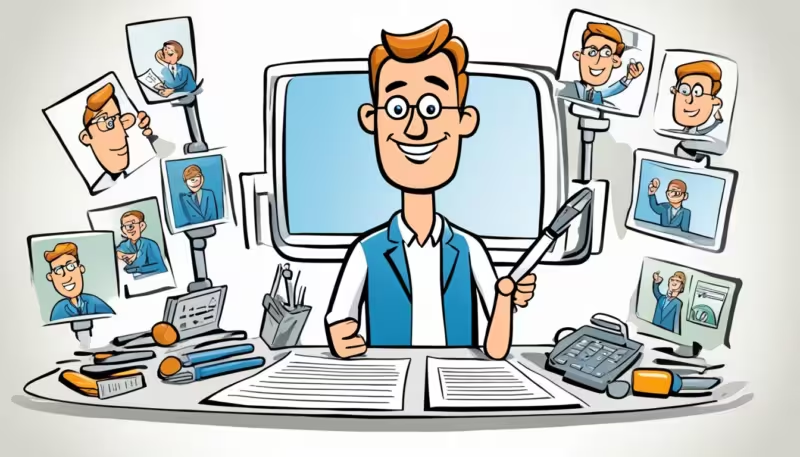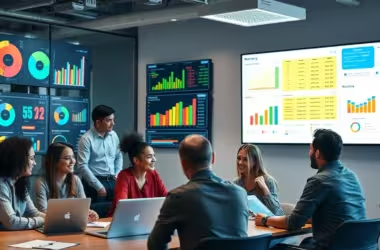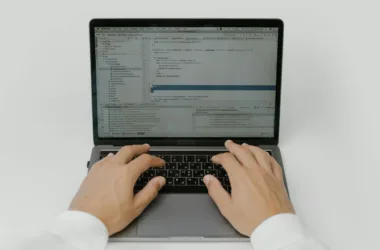Have you ever thought about how mock interviews could boost your chances of getting your dream job? Today’s job market is very competitive. Many don’t realize how helpful a mock interview is. It lets you practice interview skills and find areas you can get better at. All this happens in a safe space. This article will give you expert advice on how to do great in mock interviews. You’ll learn how to be more confident and show potential employers your best side.
Understanding the Importance of Mock Interviews
Mock interviews are key for those looking to do well in real interviews. They let job seekers hone their skills and receive constructive feedback from experts. This leads to success. Mock interviews are crucial because they lower stress, boost confidence, and get candidates ready for real interviews.
The Interview Training Simulator at Herzing University Career Center is a great tool. It helps job seekers perfect their answers. Plus, it covers important things like being on time, dressing right, and how to act. Mock interviews give a safe space to practice different types of questions. This builds the confidence needed to show what makes them unique.
- Mock interviews help reduce filler words and improve public speaking abilities.
- They foster strong listening skills, essential for providing relevant responses.
- Candidates can practice negotiation techniques, particularly in salary discussions.
- They offer a structured way to apply the STAR method for behavioral questions.
Adding mock interviews to your prep can really improve how you perform. They help match your skills with what employers want. This makes your presentation more powerful.
What Is a Mock Interview?
A mock interview is like a practice session for a real job interview. It helps candidates get better at how they speak, move, and answer questions. Mock interviews are key for job seekers wanting to improve.
There are six kinds of mock interviews to help different needs. Job seekers, people aiming for a promotion, and those in technical fields benefit. They get to practice and receive advice on how to do better.
- New job seekers work on answering common questions and spotting their faults.
- Career growers practice their leadership and technical skills for better positions.
- Technical interviews in fields like technology test problem-solving skills with real issues.
Mock interviews bring many advantages. They prepare candidates well for the real thing.
- They offer great practice and experience.
- Feedback helps improve skills.
- They boost confidence and skill.
- Candidates get to understand what employers look for.
By doing a mock interview, candidates can face real interviews more confidently. This practice makes them stand out to employers. It can really change their chances for the better.
Benefits of Participating in Mock Interviews
Mock interviews offer huge benefits for job seekers. They mimic a real interview setting, helping candidates sharpen skills essential for success. This hands-on practice boosts a candidate’s readiness for the job market.
One key benefit is building confidence. Getting familiar with the interview process makes the real thing seem less scary. After mock interviews, many feel more calm and ready, reducing stress before the actual interview.
Participants get valuable feedback in mock interviews. They learn what they’re doing well and what needs work. This tailored advice, especially from experts, helps improve interviewing skills and communication.
- Mock interviews prep candidates for different interview types, like video and face-to-face meetings.
- They teach effective response strategies, like the STAR method, to share experiences compellingly.
- Candidates learn real interview dynamics, including dressing right and managing time for concise answers.
Investing 3-4 hours in practicing mock interviews can greatly boost your job chances. First-time job seekers might see 3-4 times more interview offers. For those already getting interviews, such preparation could double their job landing chances.
Ultimately, mock interviews do more than build skills. They change how candidates view interviews, turning nervousness into active engagement. You’ll start seeing the interview as a chance to solve problems together.
Preparing for Your Mock Interview
Getting ready for a mock interview is a big step. First, learn about the company and job you want. This lets you give better answers and ask smart questions.
Look for handouts on different kinds of interviews, like job or scholarship ones. Use the STAR method to organize your answers well. Instead of learning answers by heart, talk about key points that match the job.
Try doing these mock interview activities:
- Videotaping your mock interviews for self-review
- Splitting common questions for constructive feedback
- Practicing the “Tell ‘me about yourself” prompt
- Simulating phone or webcam interviews to build comfort
About 70% of people feel more confident after mock interviews. Also, 85% of folks who get jobs have done mock interviews to get better.
Arrive 15-30 minutes early to improve your success chance by 75%. Dress well for the mock interview. It helps, as 67% of those who get jobs say their clothes played a part. Bring your resume and a notepad to get and use feedback well.
Mock interviews prep you for “behavioral and situational” questions. Practice these to talk naturally. Avoiding rote learning makes you 60% more likely to seem genuine.
Good mock interview prep shows off your skills and builds readiness. With solid practice, you’ll walk into real interviews feeling sure of yourself.
Researching the Company and Role
Doing your homework on the company is key for a good interview. Knowing what the company stands for helps you answer questions in a way that shows you really care about being there. Job seekers who know about the company are 85% more likely to make a good impression.
Understanding the job you want is just as crucial. Get to know the duties and what problems the company is facing. Showing you know what’s up can really make you stand out. Interviewers want candidates to clearly get the company’s mission, with 72% expecting it.
To get this right, try these research tips:
- Check out the company’s social media for the latest on their culture and projects.
- Listen to quarterly earnings calls and read annual reports on their website.
- Look at employee reviews on Glassdoor to see what working there is like.
- Compare with competitors to get the big picture of where the company stands.
- Talk to current employees or former ones to get the inside scoop on the culture.
Be ready to chat about how the company is doing and where it’s heading. Showing you understand the numbers and trends makes employers see you as 70% more valuable. Knowing about the competition and what the field looks like shows you’re serious and well-prepared for the interview. This kind of prep work not only proves you know your stuff but also that you’re excited about the job.
Developing Your Personal Pitch
A personal pitch can make or break your first interview impression. It’s a brief verbal presentation that tells who you are and what makes you valuable. Think of it as your introduction in 30 to 60 seconds, giving just enough to draw the listener in.
When building your pitch, focus on being clear and confident. Keep these five elements in mind:
- Introduction: Say your name and share a bit about yourself.
- Summary of what you do: Talk about your current job and what you do there.
- Your value proposition: Share what makes you stand out in your field.
- Specification of what you want: Tell them your career goals or what job you’re seeking.
- Closing: End with a call to action, like a question or an offer to help.
Use the STAR method—Situation, Task, Action, Result—to tell about your experiences. This makes your pitch structured and memorable. Customize your pitch for your audience to show you understand their needs. Ending with a question can help start a conversation.
In today’s job world, 70% of jobs are found through networking, says the U.S. Bureau of Labor Statistics. A good elevator pitch makes you memorable to employers, alumni, and connections. Practice it with a friend for honest feedback. But keep it natural to avoid sounding scripted.
Practicing Common Interview Questions
Getting to know common interview questions is key to preparing well. Many job seekers feel nervous and often come unprepared. By practicing answers, you can feel more confident and speak clearly.
Questions like “What is your greatest strength?” and “What are your weaknesses?” are asked a lot. When asked “Why do you want to work for our company?” be ready to talk about more than just the pay. Talk about what you’re good at and what you’re working on. Interviewers like it when you’re honest and talk about how you’re trying to get better.
Debra Wheatman points out that being asked about a mistake you’ve made is common. You should be ready to talk about how you fixed it. It’s good to have main points in mind instead of memorizing responses. This makes the conversation feel real.
Practicing interviews with experienced people helps a lot. They can give you feedback that’s unbiased. Videoing yourself during practice interviews lets you see what you need to work on. Getting tips from an interview coach can also help. They make sure you present yourself well and fit the company and the job.
Overall, practicing for interviews does more than just prepare you. It makes the entire interview process better. You’ll be able to go through it confidently and professionally.
Mock Interview Techniques to Enhance Performance
Mock interview techniques can significantly improve your real interview skills. Focus on important parts like body language, how clear you speak, and listening well. Get ready by setting up practice interviews during a few class times, each 45 minutes long. Coming early, five to fifteen minutes before, makes a good impression. Ensure each practice interview lasts five to ten minutes for each student for thorough practice.
Use a rating scale of 1 to 5 to judge speaking and actions during the interview. Feedback should look at how prepared you are, if you use examples, and how excited you seem about the job. Many times, people don’t get chosen for a job because they don’t communicate well. It’s crucial to focus on interview skills. What to be judged on includes:
- How clear and brief your answers are
- Bringing in personal stories and fitting examples
- Keeping eye contact and showing good body language
- Avoiding negative comments
Recording your practice interviews can be very helpful. Videos show how you talk and act, pointing out strengths and what needs work. Maybe you need to handle nerves better or cut down on “umms”. Watching yourself can be a big help in improving.
Practice with real interview questions and asking your own questions to get ready for real interviews. Getting honest opinions from friends or mentors after each practice is key for getting better. Regular mock interviews lower stress and boost confidence for handling real interview pressure well.
First Impressions Matter
Making a good first impression in interviews is key. People judge quickly based on looks, gestures, and mood. Thus, knowing interview manners is crucial.
Being detailed helps you stand out in interviews. Get to in-person meetings about 10 minutes early. Make sure you’re seen and heard well in video calls. Good light and a clear microphone matter.
- Punctuality shows respect for the interviewer’s time.
- A professional, distraction-free background is crucial for remote interviews.
- Proper hydration and restful sleep lead to better cognitive function, crucial during interviews.
How you act without words is big in interviews. Keep eye contact and handshake firmly to show you’re serious and up for the job. Dress right, especially for formal places. Wearing navy blue or charcoal shows you’re reliable.
First impressions stick, so changing a bad one is hard. Speak clearly and with confidence to keep your image up. Ready yourself and pay attention to how you come across. This improves your chances in any interview.
Effective Communication Skills During Interviews
Mastering effective communication skills is key in interviews. Candidates must articulate their thoughts clearly and concisely. It’s also crucial to maintain steady eye contact, as 83% of interviewers see this as a sign of honesty and a way to connect.
Being able to engage with the interviewer actively is important too. Answering questions thoughtfully encourages a two-way conversation.
Being well-prepared is vital for good communication. Doing research on the company and practicing interview questions helps. And remember, 68% of interviewers prefer answers that are clear and to the point. This approach can leave a strong impression.
Active listening is essential for effective communication. It shows you’re interested and helps to avoid misunderstandings. Using positive language makes you appear confident and professional, qualities employers value highly.
- 91% of interviewers find a firm handshake important during initial greetings.
- 76% of interviewers prefer candidates who dress in conservative business attire.
- 87% of interviewers appreciate candidates who use proper grammar during interviews.
- 95% of employers consider sending a thank you note within 24 hours post-interview essential.
With advice from 70 experts, improving interview techniques can boost your communication skills. Adaptation is crucial, as interviews can vary greatly. Prepare well and use effective communication to move through your interviews with assurance.
Navigating Challenging Questions
Interviews often come with challenging interview questions. These test how well a candidate can solve problems and adapt. Staying calm and thinking carefully is key when answering hard questions. A Glassdoor survey found that 88% of hiring managers think being able to handle tough questions is very important. This shows why being ready and practicing is crucial.
Getting ready helps candidates deal with the stress these questions bring. Research shows that 60% of hiring managers value strong problem-solving skills in candidates. Also, nearly 60% of job seekers see tough questions as a big stressor in interviews. So, it’s important to have a plan for these tough moments.
- Active Listening: Listening carefully helps understand the question better, making it easier to give a clear answer.
- Structured Responses: Using the STAR (Situation, Task, Action, Result) method helps organize answers well.
- Demonstrating Adaptability: Showing you can adjust to surprises is something employers look for.
About 40% of job candidates think hard questions are the biggest challenge. But with good preparation, they are more confident and do better. Being real and honest about past experiences helps connect with the interviewer. This honesty makes a candidate stand out, showing they are open to learning and improving. Successful candidates show they can learn from past challenges with integrity.
Follow-Up After the Mock Interview
A good follow-up is key after a mock interview. It’s nice to send a thank you note to your interviewer. This shows them you are thankful and really into the job. It also makes you look professional and builds a stronger bond with the interviewer.
When you send your thank-you message is important, too. Try to send an email saying thanks within 24 hours. Doing this keeps you on the interviewer’s mind and shows you’re eager. If they didn’t say when to expect a reply, you can send a reminder email in a week.
Here’s a good way to keep in touch:
- Send the first follow-up email a week after your mock interview.
- Send another if you haven’t heard back in another week.
- If there’s still no reply, try one last email a week later to show you’re still interested.
While waiting to hear back, keep applying for other things. Don’t send more than two or three follow-ups in a month, so you don’t seem pushy. Change your messages a bit for different people. This makes a better impression and shows you value their feedback from the interview.
Choosing the right words and timing for your follow-up messages can really help. It can increase your chances for future jobs and leave a good impression with your interviewer.
Conclusion
Mock interviews are a key step in getting ready for real job interviews. They help you understand the details of various jobs and industries. This practice lets you work on important skills like how to talk, your body language, and how you present yourself.
These interviews are powerful in many ways. They lower stress by mimicking real interview situations. They also offer valuable feedback for personal improvement. Working with mentors gives you a chance to build your network, which is great for your career.
By doing mock interviews, you’ll gain skills that make you shine among others. With dedication and the will to get better, you can ace your job interviews. In today’s job market, using mock interviews can help you land your ideal job.






